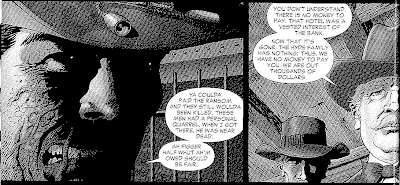
Well, maybe. One of the great things about reading Jimmy Palmiotti and Justin Gray's Jonah Hex series is that, aside from the sheer badass adventures of the meanest, ugliest, most violent bounty hunter in the old west, there are lots of subtle implications about economic development in the late 1800s United States, specifically regarding the massive industrialization and business expansion.
In his latest adventure, Hex was hired to rescue a hotel owner/manager and his daughter from a gang who had kidnapped them. In the process, Hex had burned down the hotel and upon attempting to collect his fee, the bank (who evidently hired him because of their interest in the hotel) informed him that they would be unable to pay for his services. The reason being, simply, that he burned down the source if income with which they would have paid him.
You might be wondering why it is that the bank would elect to honor their agreement at all, being that Jonah Hex technically operates outside the law. The reason is, also simply, that they fear Jonah's wrath on them might exceed that of his on the gang and the hotel.
So, we have a problem where the bank and hotel owners have no money to pay Hex. The solution that is eventually agreed upon is that the hotel owner would transfer ownership of the land on which the hotel was built over to Hex, who gladly accepts, declaring the land a fine form of currency in the rapidly industrializing economy.

I have a few comments on this:
1) I'm a bit confused as to how this transfer of ownership works. I'm not a real estate expert, especially concerning 19th century property values, but it seems to me that this is the basic way it works: someone wants to open a hotel, so he or she goes to the bank to acquire a loan for land (remember that land is considered real property and also one of the four basic factors of production in classical economics) as well as the capital to actually build the hotel. The new business owners now use the profits they earn from the hotel in order to pay back the loan, however the bank still technically owns all or part of that property until reimbursed. This is what I think the bank owner meant when he said that they had a "vested interested" in the hotel.
So, now that the hotel is burned down and the family has no means of paying back for the loan (and has no property insurance!!), it seems to me the equivalent of a default. Obviously, in this situation, it is perfectly acceptable to transfer land ownership to someone who could pay the rest of the loan (and this would also save on foreclosure costs, legal and administrative expenses, etc., and and save the owner from applying for bankruptcy), but wouldn't this still mean that Jonah would have to pay the bank? Unless his fee was so large or the amount the hotel owed was so small that they just considered it even (which I doubt) , I would think Hex would still owe the bank. And that doesn't sound very Hex, does it?
2) This demonstrates the importance of insurance (superhero insurance will be the topic of a later post).
3) Hex's comments on the last page confuse me. When asked what he would do with the land, he profoundly respond, "It's currency." Then he goes on to talk about the growth of towns and railroads, which leads to the implication that Jonah might want until the value of the property increases before he sells it to inevitably expanding businesses who might need the land. This is, first of all, an incredibly shrewd and economic tactic that is surprising coming from such a notoriously rough-around-the-edges bounty hunter. Secondly, however, Hex then goes on to say "with railroads and towns poppin' up, it's gettin' so a person can't keep to themselves. Best thing ta do is leave it clear and free." Does this mean that he actually just wants to keep the place and not sell it eventually?
All in all, Jonah Hex is a more shrewd economist than I would have guessed.


